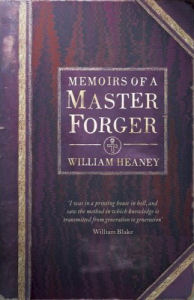A few years back I made this statement on the blog:
I have read everything Graham Joyce has ever published, and none of them have been less than excellent.
Well, in the intervening years, a few more books have been published, but the statement remains true. In fact, if anything it’s more true for the book I just read… although it’s not obviously a Graham Joyce book.
(My copy looks almost exactly like that, albeit with an Adam Roberts quote, instead of a Blake one.)
I picked up the book because a review at Fantasy Book Critic clued me in to the situation, and Joyce is on my “automatically buy, and move to the top of the to-be-read queue” list. I was shocked and surprised that I hadn’t heard through my other sources about this book, but at least I did get word that it was really Joyce’s before I missed my chance at it. (And actually, I wasn’t really going to miss it anyway, since I had already pre-ordered it in the US edition, which has a different title and admits that it’s a Joyce book, and had a later notice of the situation in the SF Revu review, or the SFSite notice. So it’s not so much that my network fell down, as that it didn’t give me advance enough notice for my satisfaction.)
It’s a wonderful book, and I’m not going to go into why–if you know Joyce you already know why, and if you don’t… well, I’m linking to lots of other reviews. I can even see why this particular book might lend itself to the pseudonym-as-literary-conceit: in a very real sense Heaney has forged an entire life for himself. And they did do some nice ancillary stuff with the pseudonym, like a LiveJournal for Heaney.
Still, I couldn’t help but wonder if the real reason for the pseudonymous release was artistic, or commercial. I spent some time trying to convince myself that it was all about the joke, and not the business. The review by the aforementioned Roberts helped with that. The fact that the novel is based in part on an O. Henry award-winning story, which you would think would help boost sales–but only if you can mention the real author’s name–would also suggest a non-commercial decision.
And, of course, Joyce explicitly said so
Well amongst the themes of the novel are matters of faked papers, forged books, fraudulent poetic persona, plagiarised publication, demon-infested manuscripts… and so on. Further, so much of what is written today as memoir (all the misery memoirs) turns out to be fraudulent or gross exaggerations, so it is also a comment on all the faked books and ghost-written crap in publishing today. Fake memoir, which is really fiction, outsells fiction. So it seemed a wizard prang to use a pseudonym, to add to the layers of forgery, as it were. But then none of us wanted Memoirs of a Master Forger to be a truly fake memoir (the subject matter is too outrageous anyway) and I also wanted everyone to know it’s by me. But Jeremy at Nightshade in the US didn’t go for it, and though I love him like a brother he’s a tough guy to argue with. So in The US it’s a Graham Joyce book with the title How To Make Friends With Demons.
But still, I had my doubts. Why would a publisher risk losing all the people who love Joyce’s books–his automatic audience? Why don’t they want my money–I mean, I found out, but if I hadn’t seen those reviews I would not have picked up the book. And I’ve seen way, way too many excellent midlist authors forced into the pseudonym thing because of the automated ordering death spiral to not be suspicious of the pseudonym.
So today’s posting at Joyce’s site was interesting to read, and reinforced my disappointment in the whole publishing industry (and the old “death spiral” thing). Apparently the book is doing very well, but… well, here’s how Joyce starts out:
Memoirs Of A Master Forger has generated probably the best crop of reviews in my career as a published writer. The book also went into reprint in its second week, something that hasn’t happened to me before. Now, lest you think there is some smugness behind that report let me say there is not. It confirms some rather worrying trends in publishing.
What’s more the relative success of William Heaney has rather put Graham Joyce’s prominent hooter somewhat out of joint. Firstly you would think that a writer with a career spanning almost twenty years, a quiver full of awards and a loyal readership and would easily be able to outsell a complete debutant. Certainly this is what you come to expect in the writing world: the idea is that you build a career, supported by booksellers who recognise your name and reviewers who know your pedigree. Well you can pretty much forget that.
If you have any interest at all in fiction, or publishing, go read the rest. In addition to the issues with the publishing industry, you get some bits about reviewers who completely miss the point, and Joyce messing about with some bureaucratic functionaries.
I want to tell you all to get the book


